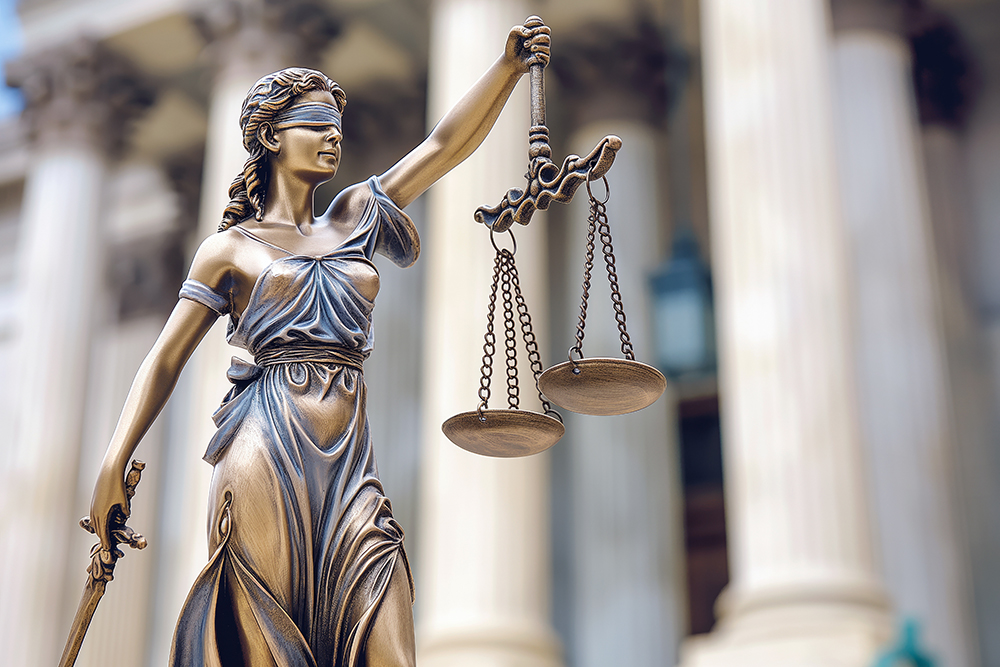
DWI/OWI/DUI Attorney New Orleans
Under Louisiana law, as written in RS 14:98, DWI is defined as “the operating of any motor vehicle, aircraft, watercraft, vessel, or other means of conveyance” under any of the following conditions:
- Being under the influence of alcohol
- While demonstrating a Blood Alcohol Content (BAC) of .08% or above
- While under the influence of any controlled dangerous substance as outlined in Louisiana Code RS 40:964
- While under the influence of prescription or otherwise legally obtained medications
- While under the influence of alcohol along with legally obtained medications
Those charged with DWI in the state of Louisiana could be looking at jail time, depending on circumstances of their own case, ranging from the severity of the incident to prior convictions on their criminal record. While those who have been charged for the first time can expect minimal jail time with the possibility of community service or probation, those being charged for the second or subsequent time could face greater jail time.
At The Claiborne Firm, we have a strong track record of getting our clients’ DWI charges reduced or dismissed, sparing them the stress and hardship of facing jail time or further consequences.
What Does A DWI Conviction Mean for Me?
If convicted of DWI, you will have that conviction on your permanent criminal record, which is publicly available to anyone – potential employers, neighbors, lenders – unless sealed and expunged under state law. For first- and often second-time offenses, this DWI conviction will usually be considered a misdemeanor. Upon third or subsequent convictions, it will more likely be charged as a felony, with greater fines and jail time.

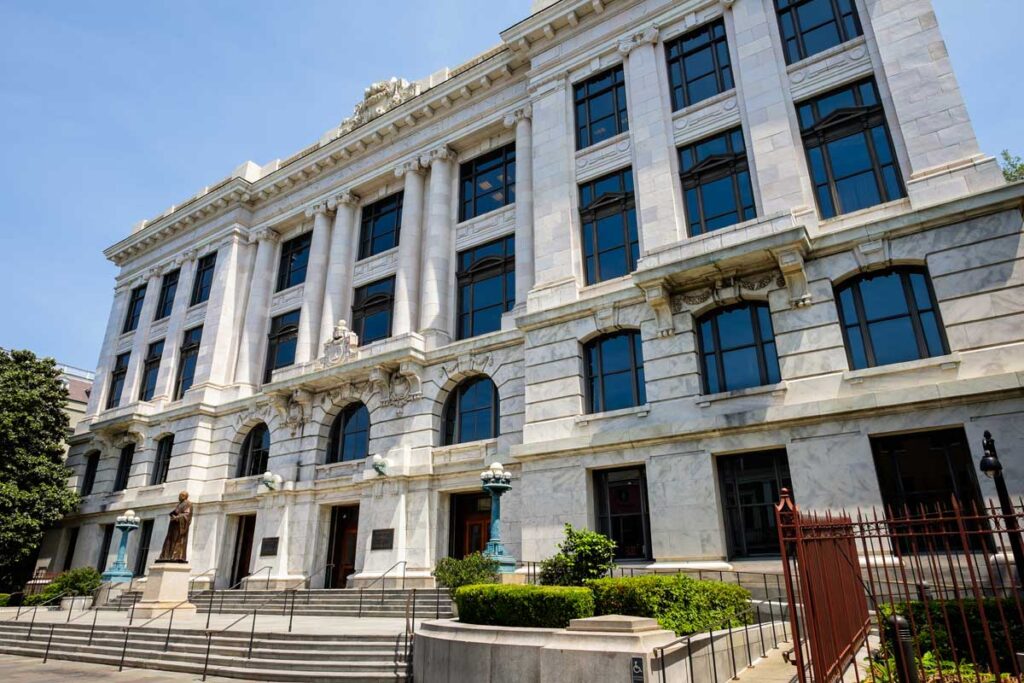
Beyond that, you can also potentially have your driving privileges suspended. Under Louisiana’s implied consent laws, you automatically agree to chemical testing by law enforcement if they suspect you of driving while impaired. Declining this test could lead to a suspension of your license.
Challenging a License Suspension for DWI
If you license has been suspended, Louisiana law grants you 30 days in which “to make written request to the Department of Public Safety and Corrections for an administrative hearing.” Essentially, as written in Louisiana Revised Statues 32:667A(2), your license will be suspended if you fail to respond during that 30-day window.
This administrative hearing does far more than allow you to dispute your license suspension in court. It also allows your attorney the opportunity to prepare your defense for the separate criminal charges you face. For example, it allows them to:
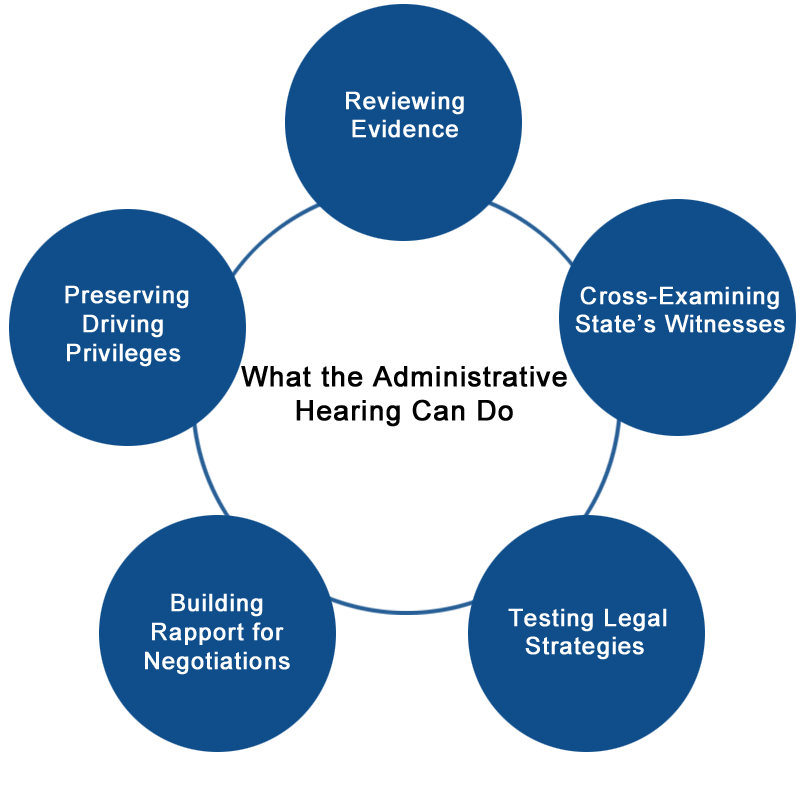 • Review the Evidence Beforehand. From the breathalyzer results to the police report, your attorney will get an advanced look at the facts before trial. This is vital in helping them determine the strength of the case against you, informing their strategy.
• Review the Evidence Beforehand. From the breathalyzer results to the police report, your attorney will get an advanced look at the facts before trial. This is vital in helping them determine the strength of the case against you, informing their strategy.- • Cross-Examine the State’s Witnesses. While the arresting officer will typically not testify, any experts called upon by the state will be open to cross-examination by your attorney, providing further insight into any weaknesses in the case.
- • Test Strategies. By presenting legal arguments to the administrative judge as to the admissibility of evidence or any procedural errors, your attorney can better understand how the judge in a criminal case may respond.
- • Bolster Negotiations. The interactions between your attorney and the administrative law system can help build a rapport that can provide a more favorable outcome during negotiations or plea bargaining in the criminal case.
- • Maintain Your Driving Privileges. By overturning your license suspension, your attorney can restore your driving privileges so you can continue to drive for work or personal obligations.
How does an Administrative Hearing Work?
As the initial proceedings before a criminal case, the administrative hearing focuses on the suspension of your driver’s license. Separate from the criminal case against you, an administrative hearing generally follows this process:
- • Step one: Introduction of Evidence. At this stage the judge will introduce evidence collected by the Department of Public Safety and Corrections (DPSC) including the officer’s initial probable cause, the details of the incident in the arrest report, and the results from any tests given.
- • Step two: Review of Circumstances. Reviewing the officer’s testimony, the judge will then determine the validity of the reasonable grounds on which you were initially pulled over.
- • Step three: Assessment of Procedures. At this stage the judge will ensure that proper protocol was followed during the arrest, such as whether you were informed of your rights and of the consequences that stem from refusing to be tested.
- • Step four: Chemical Test Results. Assuming a test was conducted during the initial stop, at this point the judge will review the results to determine whether they reflect a BAC of .08% or higher (.02% for those under 21 years old).
- • Step five: Refusal of Chemical Test. At this stage, the judge will weigh the refusal of a chemical test (if such refusal was made) against Louisiana’s implied consent laws.
- • Step six: Witness Testimony. This will be your attorney’s opportunity to call in witnesses and subject matter experts to challenge the test results or procedural errors during the arrest.
- • Step seven: Legal Arguments. Here your attorney will be able to challenge admissibility of evidence and present arguments against their relevance or suitability.
- • Step eight: Decision. This will not typically happen right away, but rather will be issued as a written decision at some point in the next 30 days whether to uphold the suspension or set it aside.
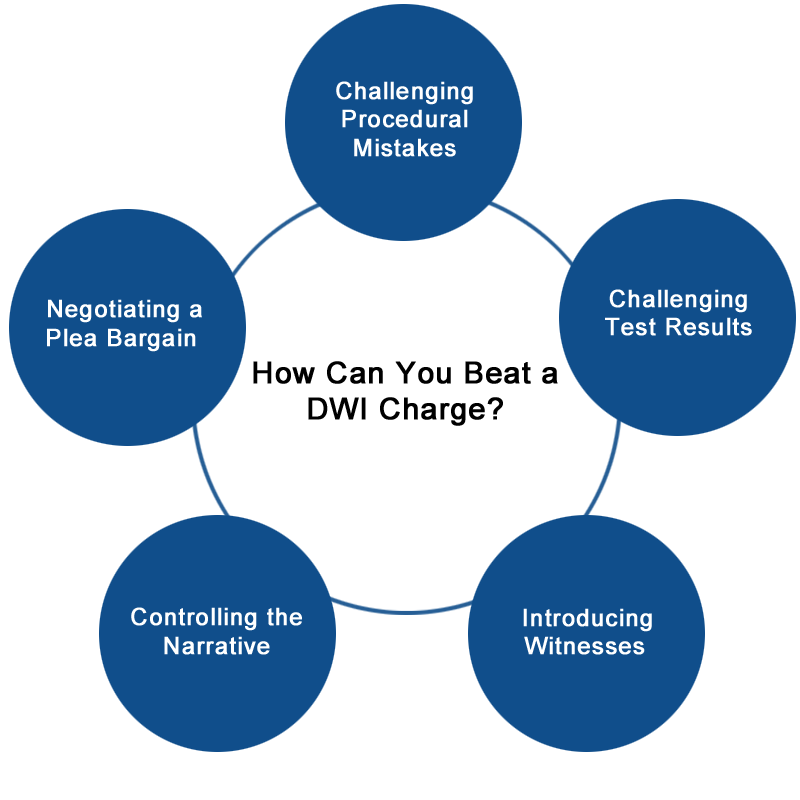 How Can You Beat A DWI Charge?
How Can You Beat A DWI Charge?
While the prosecution may present their case against you as insurmountable, there are a variety of ways in which your attorney can challenge it. A few strategies that The Claiborne Firm has successfully used to have our clients’ DWI charges reduced or dismissed include:
Challenging Procedural Mistakes: This can include questioning the reasonable suspicion for the initial stop, the probable cause for the arrest, or the subjective conclusions reached by the officer. It can also mean contending that evidence was mishandled, that testing procedures weren’t adequately followed, or that you were not observed for the requisite period before the test.
Challenging Test Results: In some cases, your attorney will be able to question the validity of the equipment itself – its reliability, calibration and proper maintenance. Your attorney may also dispute the results, by introducing medical conditions, dietary factors, environmental factors or mouth alcohol that may have skewed the reading. BAC can vary wildly moment-by-moment and person-to-person, casting greater doubt on the case against you.
Introducing Witnesses: Witnesses who were present at the time of the arrest could be called in to provide testimony that contradicts police accounts, or experts could shed light on issues surrounding the case such as reliability of testing equipment.
Controlling the Narrative: By providing alternate explanations for your appearance, actions or inability to properly drive, your attorney can weaken the case against you. And by filing motions that suppress evidence collected against you in violation of your Constitutional rights, they can increase the chances of negotiating a plea bargain.
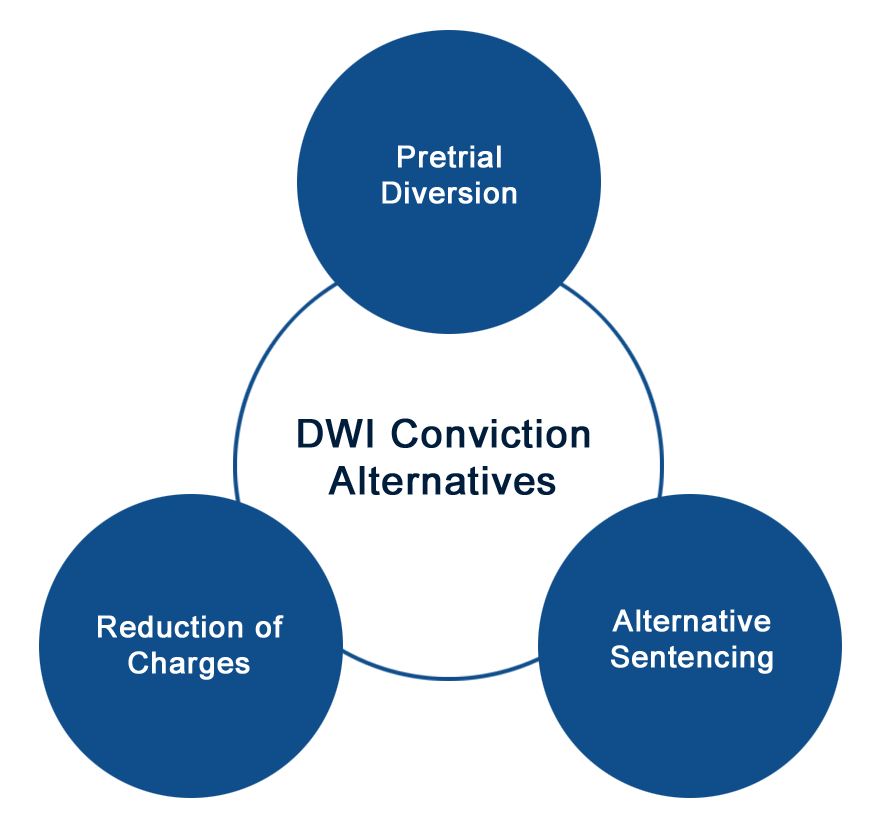 What Alternatives Are Available to A DWI Conviction?
What Alternatives Are Available to A DWI Conviction?
In certain cases, your attorney can work with the prosecution to secure an alternative to a conviction. Some of these options include:
Pretrial Diversion: Generally reserved for those facing their first DWI offense, deferred sentencing allows the defendant to plead guilt and then complete requirements of probation. Once those requirements are met, the conviction can be dismissed and potentially expunged, sealing it from public record. Governed by Louisiana Criminal Procedure Article 894, this option is largely at the judge’s discretion but does allow defendants to avoid time in jail.
Alternative Sentencing: There are options available to first-time offenders for reducing jail time in favor of options such as community service or probation. Aimed at fostering rehabilitation, the specifics of alternative sentencing are solely at the discretion of the judge.
Reduction of Charges: Under certain circumstances, and if the prosecution is willing to agree to a plea bargain, a charge of DWI can be reduced to “wet reckless.” This lesser charge, a specific type of reckless driving, is a possibility that depends on several factors such as a relatively low BAC and lack of criminal record.
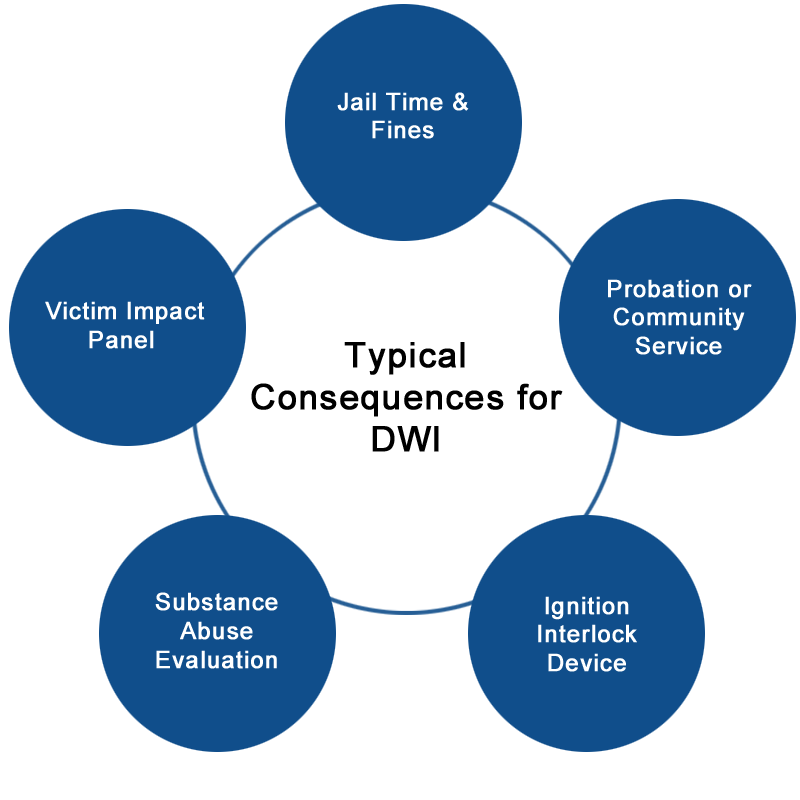 What Are The Typical Consequences for DWI?
What Are The Typical Consequences for DWI?
While individual circumstances will determine the extent of the punishment for conviction of a DWI, the following provides a rough guideline on what to expect for first, second and subsequent convictions. As each is considered a prior offense to the next, fines and penalties escalate accordingly.
First Offense: Jail time of up to six months and fines up to $1,000. Additional consequences could include community service, mandatory attendance at a victim impact panel, court-ordered driver improvement program and suspension of license. Probation is possible, requiring conditions from treatment to substance abuse evaluation.
Second Offense: Mandatory jail sentence of at least 48 hours, with potential for further sentencing between 30 days and six months, plus fines of up to $1,000 and two-year probation. Further penalties include 240 hours of community service, installation of an ignition interlock device (IID), plus evaluation and treatment for substance abuse. Potential penalties beyond that include attendance at a victim impact panel, two-year license suspension and SR-22 insurance.
Third Offense: As a felony, a third offense carries a jail term between 1-5 years, with at least one of those years being served without suspension, plus fines that reach $2,000. This will be followed by probation of up to five years, include a minimum six months of house arrest. In addition, those convicted will serve 240 hours of community service, have their vehicle seized and sold, undergo substance abuse evaluation and treatment, and could potentially attend a victim impact panel.
Fourth (or Subsequent) Offense: In addition to fines reaching $5,000, those who earn a fourth or greater conviction will spend between 10-30 years in jail, with minimum two years without suspension, plus five years probation after release with one year of home incarceration. They will serve 320 hours of community service, have their vehicle seized and sold, plus be sent for substance abuse evaluation and treatment and possibly attend a victim impact panel.
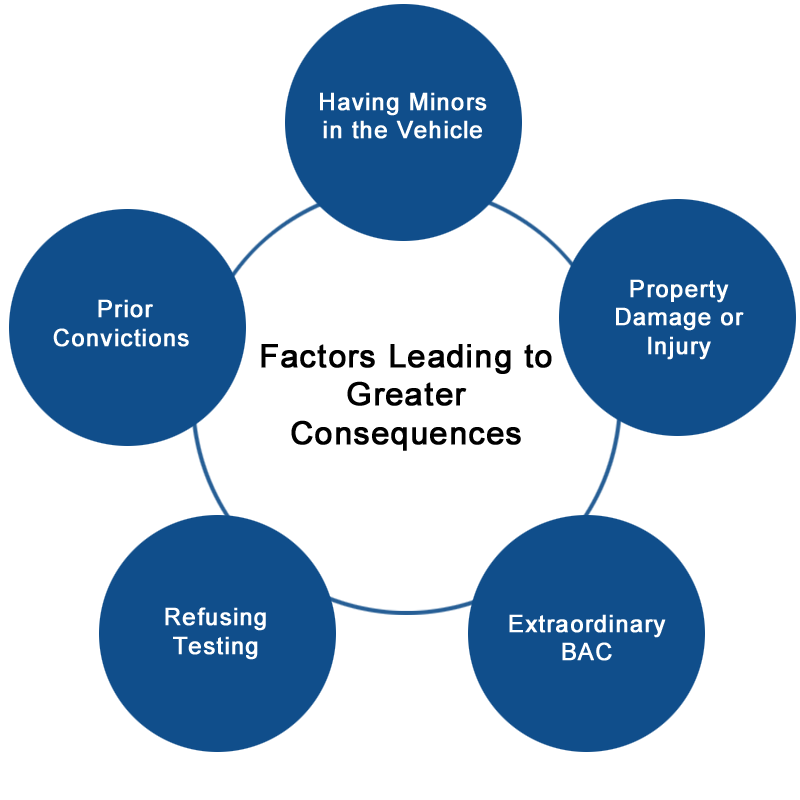 There are several aggravating factors that can lead to greater consequences regardless of whether this is a first or a fourth conviction. These include:
There are several aggravating factors that can lead to greater consequences regardless of whether this is a first or a fourth conviction. These include:
Having Minors in the Vehicle: The presence of a child 12 years or younger automatically disqualifies those convicted from seeking a suspended sentence.
Property Damage or Injury: Damage to other motorists or property can increase fines and jail time, plus a separate conviction of vehicular negligent injuring or vehicular homicide are considered as prior convictions when determining sentencing.
Extraordinary BAC: While a BAC of .08% is considered DWI, higher BAC readings carry greater penalties. For a BAC over .15%, Louisiana law requires a minimum 96-hour jail sentence. A BAC of .20% adds a $1,000 fine on top of that 96 hours. These higher readings will also require a four-year license suspension as well as mandatory installation of an IID for no less than three years.
Refusing Testing: While field sobriety tests are not legally required in the State of Louisiana, the implied consent law means that refusing a sobriety test of either blood or breath to determine BAC can trigger greater penalties. These can include automatic license suspension. Your refusal can also be used as evidence against you at trial.
You Can Fight Back
The Claiborne Firm has a history of helping clients battle back against charges of DWI. We come to the negotiating table and the courtroom better prepared than the prosecution, giving us the edge in securing a plea or convincing a judge or jury. Our signature approach, informed by proven tactics, have helped us secure the best outcome for countless clients who faced the same challenges you do. Take control back and restore your freedom by scheduling a confidential, no-obligation consultation.
Call (504) 294-8552 or Schedule a Free Case Evaluation Online
